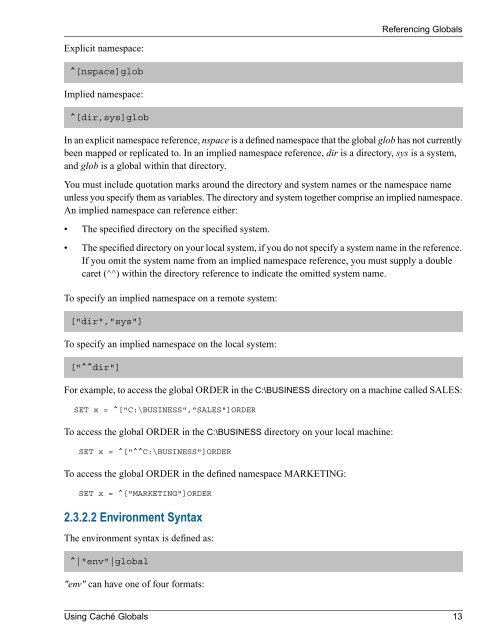Using Caché Globals - InterSystems Documentation
Using Caché Globals - InterSystems Documentation
Using Caché Globals - InterSystems Documentation
Create successful ePaper yourself
Turn your PDF publications into a flip-book with our unique Google optimized e-Paper software.
Referencing <strong>Globals</strong>Explicit namespace:^[nspace]globImplied namespace:^[dir,sys]globIn an explicit namespace reference, nspace is a defined namespace that the global glob has not currentlybeen mapped or replicated to. In an implied namespace reference, dir is a directory, sys is a system,and glob is a global within that directory.You must include quotation marks around the directory and system names or the namespace nameunless you specify them as variables. The directory and system together comprise an implied namespace.An implied namespace can reference either:• The specified directory on the specified system.• The specified directory on your local system, if you do not specify a system name in the reference.If you omit the system name from an implied namespace reference, you must supply a doublecaret (^^) within the directory reference to indicate the omitted system name.To specify an implied namespace on a remote system:["dir","sys"]To specify an implied namespace on the local system:["^^dir"]For example, to access the global ORDER in the C:\BUSINESS directory on a machine called SALES:SET x = ^["C:\BUSINESS","SALES"]ORDERTo access the global ORDER in the C:\BUSINESS directory on your local machine:SET x = ^["^^C:\BUSINESS"]ORDERTo access the global ORDER in the defined namespace MARKETING:SET x = ^["MARKETING"]ORDER2.3.2.2 Environment SyntaxThe environment syntax is defined as:^|"env"|global"env" can have one of four formats:<strong>Using</strong> <strong>Caché</strong> <strong>Globals</strong> 13

















